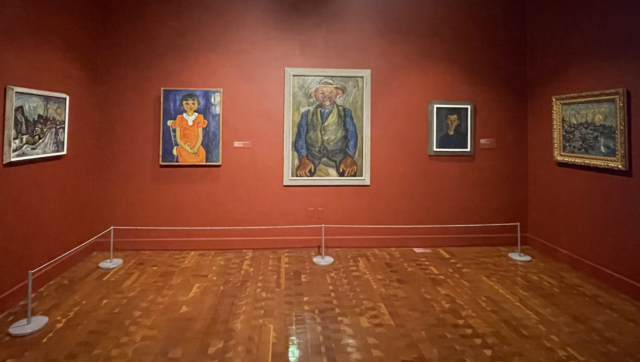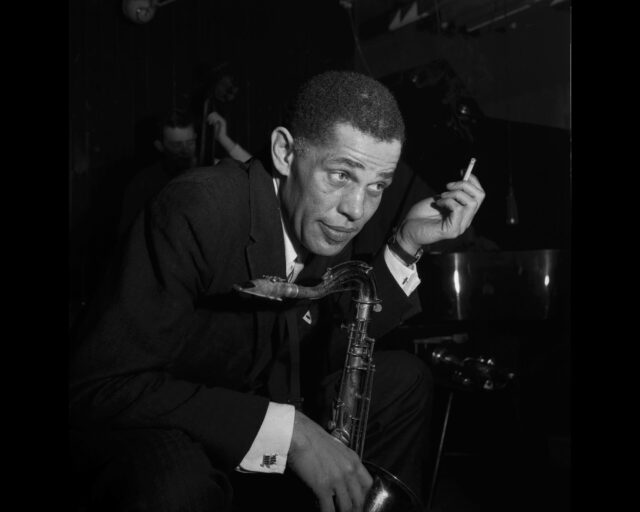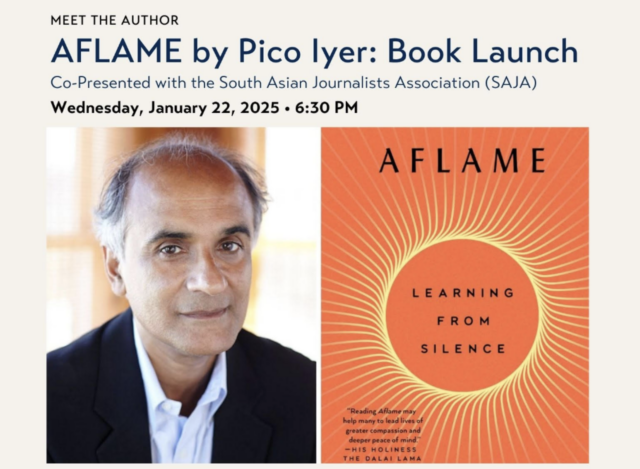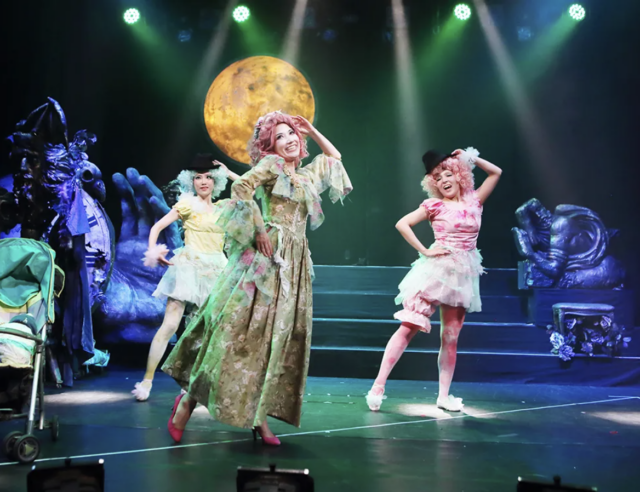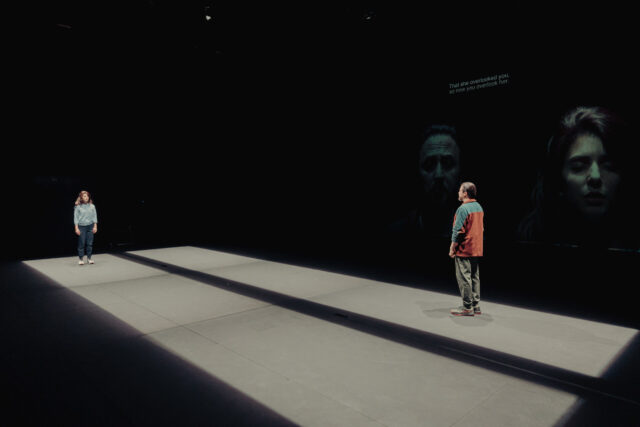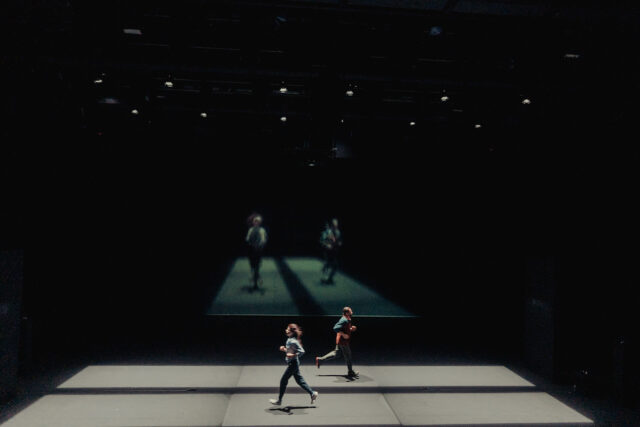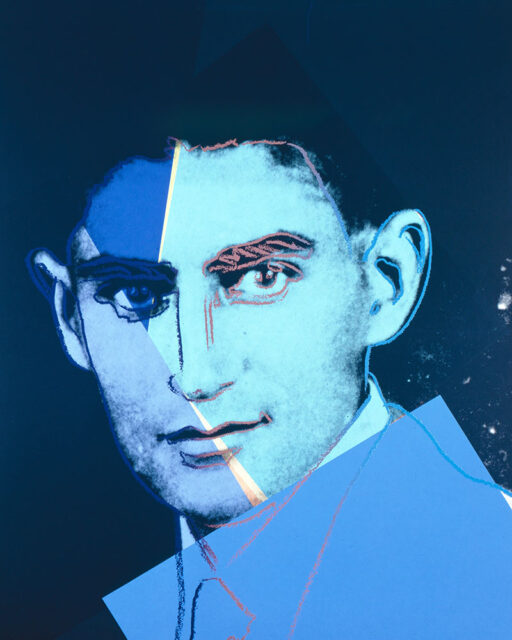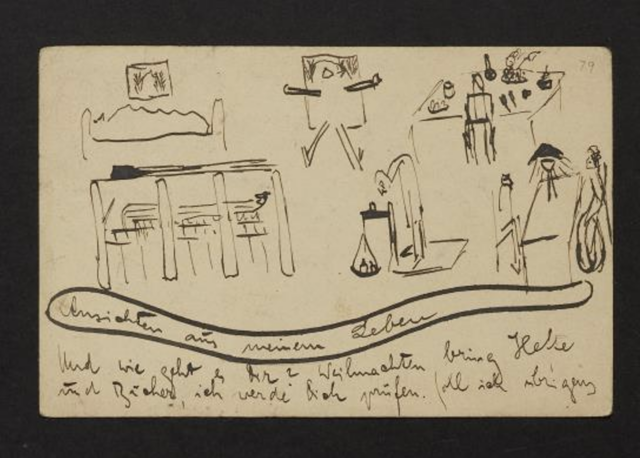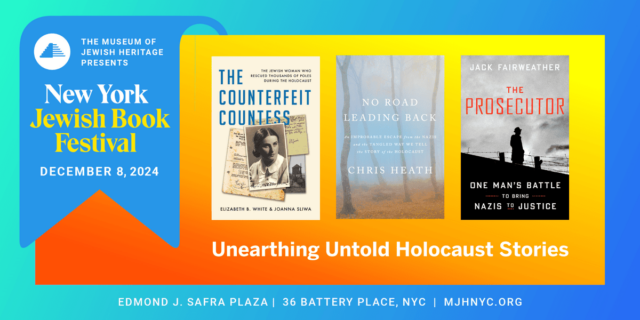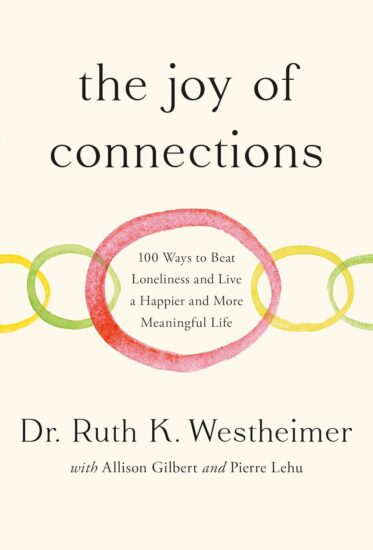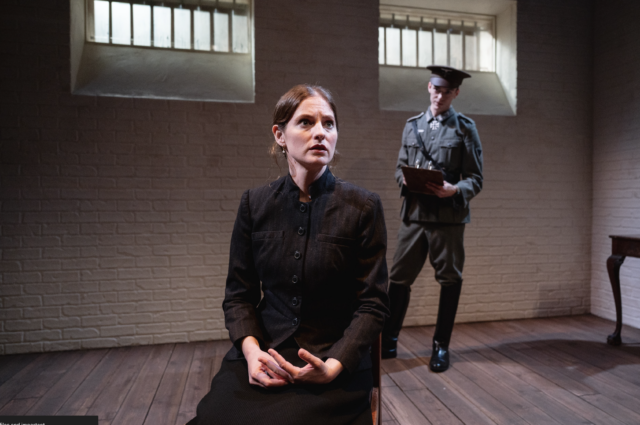
Hannah Stern (Ella Dershowitz) is watched by Gestapo officer Karl Frick (Brett Temple) in gripping play at WP Theater (photo by Valerie Terranova)
MRS. STERN WANDERS THE PRUSSIAN STATE LIBRARY
WP Theater
2162 Broadway at Seventy-Sixth St.
Through January 19, $39 – $129
www.mrssternwanders.com
wptheater.org
Last Saturday, I saw two shows involving Jewish writers, one a German woman who revolutionized political philosophy, the other a Polish man who kept a dying language alive through fictional narratives rich with folklore and history. Both were born in the first decade of the twentieth century, wrote about the Holocaust, had unique relationships with Zionism, and died in America.
The first play is a taut, gripping tale inspired by the little-known 1933 arrest of Hannah Arendt by the Gestapo, while the second is a slight but entertaining retelling of three Yiddish short stories by Isaac Bashevis Singer.
Jenny Lyn Bader’s Mrs. Stern Wanders the Prussian State Library is one of the best dramas of the year. The ninety-minute Luna Stage production opened in October at 59E59, where I saw an early preview, and has now moved to the WP Theater, where it continues through January 19 in an even better version. Bader is intimately familiar with Arendt’s life and career; her husband, Roger Berkowitz, founded the Hannah Arendt Center for Politics and Humanities at Bard College, where she has served on the board of advisers.
As the audience enters the space, they are instantly immersed in Arendt’s world in 1933 Berlin, through period music and Lauren Helpern’s stark set, a prison cell with two empty chairs, the white walls reaching out toward us. It feels like a warning that any of us could end up being interrogated under the dangling light fixture, then or now, especially given the rise of antisemitism across the globe. Barred, opaque windows do not promise hope.
A twenty-six-year-old burgeoning historian, philosopher, and author, Arendt (Ella Dershowitz) — whose married name at the time was Stern; she and her first husband, Günther Anders Stern, would divorce in 1937 — has been brought in by the Gestapo, along with her mother, who is in a separate cell. What Hannah thought would be just a brief questioning turns into several days of interrogation by Karl Frick (Brett Temple), an inquisitive Aryan guard who appears to be just as interested in her philosophy as in the identities of her dissident, Zionist friends.
After Hannah grimaces upon taking a sip of the coffee Karl has given her, he asks, “Do you not like the coffee?” She responds, “If I may speak freely? It’s terrible.” Karl: “Sorry to hear it. But at least I know you answer questions truthfully.” Hannah: “It wouldn’t occur to me to answer them any other way.” Karl: “That will make our time together easier.” It’s an intimate, critical moment that establishes the two characters and how they will relate to each other, Karl displaying genuine concern — it’s his first day on this new job, having been promoted from the criminal police to the political police — while Hannah plays a clever game of cat and mouse.
Karl grows suspicious when Hannah is visited by Erich Landau (usually played by Drew Hirshfield, although I saw his understudy this time, Jay DeYonker), a lawyer purportedly sent by the Zionists. “They are changing laws they made yesterday, then changing them again, by arbitrary police decree,” Hannah explains. Erich replies, “‘Arbitrary’? How can you say that? Laws create order!” Hannah answers, “In a classic dictatorship, yes. But the Nazis want chaos.”
Over the course of several days, Karl and Hannah discuss forced immigration, false idols, the arts, assimilation, love, the Bible, vegetarianism, German writer Rahel Varnhagen, and the Jewish Question as he tries to get information out of her while she cagily parries, brilliantly careful about everything she offers him.
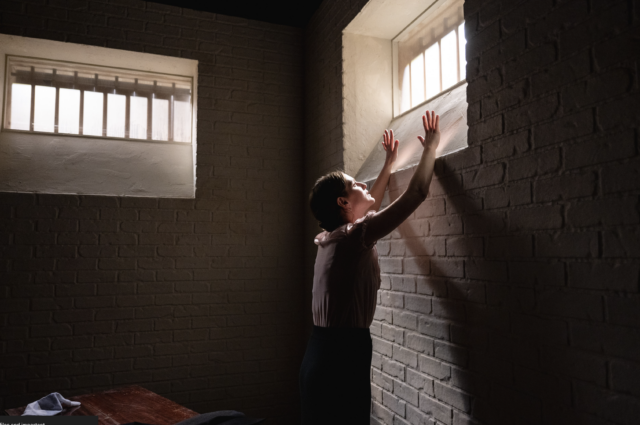
Ella Dershowitz excels as a young Hannah Arendt in Mrs. Stern Wanders the Prussian State Library (photo by Valerie Terranova)
In Mrs. Stern Wanders the Prussian State Library Bader (The Whole Megillah: A Purim Spiel for Grown-Ups, None of the Above, Manhattan Casanova) captures the fear that many Jews live with, whether in 1933 Germany or 2024 America as the rule of law grows ever more arbitrary — and purposefully vindictive. The show is expertly directed by Ari Laura Kreith (Heartland, 167 Tongues); even though we know what’s ultimately going to happen, in general if not in the specific details, we are kept on the edge of our seats like a tense thriller, each scene offering new surprises and philosophical insight about what happened then — and can happen again.
A dead ringer for Natalie Portman, Dershowitz (Connected, Can You Forgive Her?) — whose father, controversial lawyer Alan Dershowitz, once debated Arendt and has written extensively about her (unfavorably) and whose husband’s last name is Stern — portrays Arendt with an astute elegance, from the way she smokes a cigarette and holds a cup of coffee to how she climbs on a table to look out the window, freedom just out of her grasp. Temple (The Valley of the Shadow, Henry IV, Part One) imbues Karl with a gentle vulnerability and curiosity not usually associated with Gestapo officers, while DeYonker, a five-year member of the Prague Shakespeare Company, is effective in his small but key role as the lawyer.
“Personally I think that’s the first big mistake in the history of thought — that truth comes at the end. I think truth comes at the beginning of a thought,” Hannah tells Karl at one point. In her February 1967 New Yorker article “Truth and Politics,” Arendt wrote, “We must now turn our attention to the relatively recent phenomenon of mass manipulation of fact and opinion as it has become evident in the rewriting of history, in image-making, and in actual government policy. The traditional political lie, so prominent in the history of diplomacy and statecraft, used to concern either true secrets — data that had never been made public — or intentions, which anyhow do not possess the same degree of reliability as accomplished facts; like everything that goes on merely inside ourselves, intentions are only potentialities, and what was intended to be a lie can always turn out to be true in the end. In contrast, the modern political lies deal efficiently with things that are not secrets at all but are known to practically everybody. This is obvious in the case of rewriting contemporary history under the eyes of those who witnessed it, but it is equally true in image-making of all sorts, in which, again, every known and established fact can be denied or neglected if it is likely to hurt the image; for an image, unlike an old-fashioned portrait, is supposed not to flatter reality but to offer a full-fledged substitute for it. And this substitute, because of modern techniques and the mass media, is, of course, much more in the public eye than the original ever was.”
Watching Mrs. Stern Wanders the Prussian State Library in the context of current international politics is a chilling warning of what might lie ahead, especially if we cannot hear the voices from history, like Hannah Arendt’s.
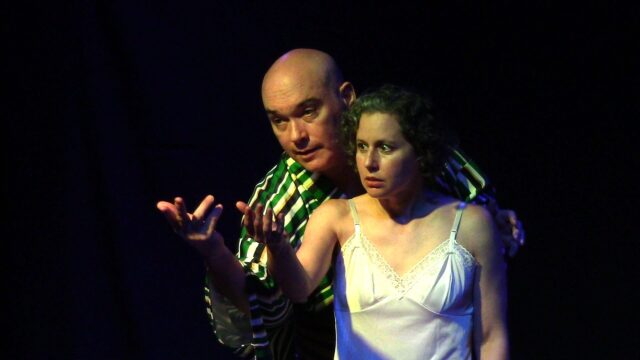
Shane Baker and Miryem-Khaye Seigel bring a trio of Yiddish shorts to life in Bashevis’s Demons (photo by Maria Clara Vieira Fernandes/Viver com Yiddish)
BASHEVIS’S DEMONS
Theatre 154
154 Christopher St. between Greenwich & Washington Sts.
Tuesday – Sunday through January 5, $50
www.congressforjewishculture.org
Previously presented in Buenos Aires and Rio de Janeiro, Bashevis’s Demons is making its North American premiere at Theatre 154 in the West Village through January 5. The seventy-five-minute show consists of three Yiddish tales by Nobel Prize winner Isaac Bashevis Singer, who wrote such books as Shosha, Satan in Goray, and Enemies, a Love Story in addition to the short story “Yentl the Yeshiva Boy,” which was made into a popular film by Barbra Streisand.
Directed and designed by Moshe Yassur with Beate Hein Bennett, the segments take place on a modest set centered by a comfy red velvet armchair on a Persian carpet, with a table off to one side with a few props, and a horizontal framed dark screen up above the stage, where operator Rokhl Kafrissen projects the English-language surtitles. Shane Baker portrays the demons, wearing a kimono and waving a fan, while Miryem-Khaye Seigel plays a married woman in white, a rabbi, and a hilariously costumed rooster.
The evening begins with 1955’s “The Mirror,” which Singer also turned into a full-length play. It’s set in 1856 in the Polish shtetl of Krashnik and is narrated by a demon who announces, “There’s a net as old as Methuselah . . . Soft as cobwebs, full of holes, it traps people even today. When a demon tires of chasing the past or spinning in a windmill’s arms, he can always settle in a mirror, like a spider in its web — and the fly must succumb.” In this case the fly is Tsirl (Seigel), a “young, beautiful, wealthy, childless woman, with lots of time and little comradeship.” Her husband is a traveling salesman who works for her father, a woodcutter, and her mother is deceased, so she often finds herself alone, missing the more active life she had in Cracow.
Distressed by her situation, she regularly goes up to the attic and sits in a velvet chair, looking into a gold-framed mirror with a crack in the middle and admiring her body. She embroiders Bible scenes, reads German poetry, and imagines heroic men coming to save her.
She is instead met by a demon in the mirror, who describes himself as an imp, a wedding jester, a clown who has “donkey ears; the horns of a ram; a frog’s mouth; and a goat’s beard. My eyes have no whites. I have no fingernails or teeth. My arms stretch like licorice, my horns bend like wax.” Through it all, Baker remains a bald man in a kimono, not changing makeup, more of a psychological demon than a physically grotesque trickster, as if any person could have a demon inside them.
Despite his ugliness, she is intrigued by him; they discuss wisdom, beauty, and desire, angels, G-d, and sin. When she leaves the attic and doesn’t come back the next day, he considers other actions, like clogging a chimney of the besmedresh or ruining the blowing of the shofar. “There’s no lack of business during the Days of Awe!” he proclaims.
When she at last returns, he offers to fly her to the garden of golden birds in Rehab the Harlot’s palace, an unimaginable journey that is a one-of-a-kind experience.
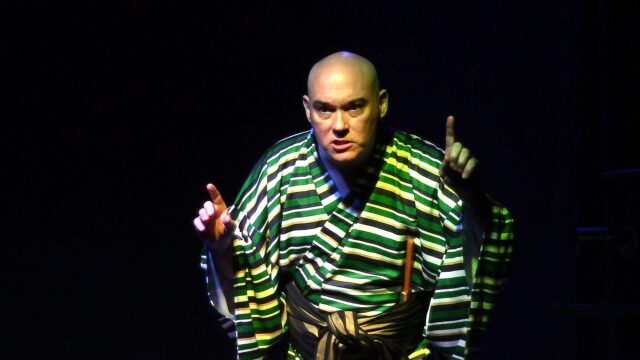
Shane Baker incorporates Yiddish and Japanese traditional storytelling in Bashevis’s Demons (photo by Maria Clara Vieira Fernandes/Viver com Yiddish)
“The Mirror” is followed by the first of two brief farcical interludes, “Thus Spake the Rooster,” adapted from Singer’s “Kukeriku,” Yiddish for cock-a-doodle-doo. Seigel, in full fowl regalia, talks about the meaning behind her kukeriku and, later, expresses her fear of Kapparot, the ancient Yom Kippur ritual where religious men swing live chickens over their heads before slaughtering them. (Singer became a vegetarian for the last thirty-five years of his life.)
Between the two-part “Thus Spake the Rooster” is “The Last Demon,” which switches between 1906 and 1956 and opens with a demon from Lublin declaring, “I, a demon, testify there are no more demons. No need, when people have themselves become demons.” He lives in frozen time in an attic in the small village of Tishevits, where he pores over a storybook filled with powerful Yiddish letters. Here, there are no flies in the spiderweb above him, not even a husk. He chatters on about Satan, a false messiah, “the good Inclination,” and Jewish writers.
He encounters a rabbi (Seigel) and decides to tempt him, one way or another, but the learned man proves to be a tough adversary. The demon decides he must appeal to the rabbi’s pride, telling him, “You alone can bring redemption or leave the world to fester for another 689,000 years.” That piques the rabbi’s interest, but when he asks the demon to give him two signs that he is telling the truth, the demon finds himself in trouble that he might not be able to get out of.
Baker, who was born in Kansas City and is not Jewish, is one of the leading figures in Yiddish theater, having performed in such shows as God of Vengeance (Got Fun Nekome) and his own translation of Waiting for Godot with the New Yiddish Rep and Tevye Served Raw, and he is the director of the Congress for Jewish Culture. He has studied with Charles Ludlam and Everett Quinton of the Ridiculous Theatrical Company, Professor Avrom Nowersztern at a Yiddish summer course organized by YIVO, and kyogen and Noh master Juro Zenchiku, and he brings all those sensibilities to Bashevis’s Demons.
Everything comes to an awkward stop when, after “The Mirror,” Baker describes the background of creating the show; it would have been better to have included that information in the small program or online, as it takes the audience out of the mystical world that Singer so often immerses readers in. “Singer casts a spell,” Joyce Carol Oates wrote. “Open one of his books anywhere, the words leap out with a power that would seem to us demonic if it were not, at the very same time, so utterly plausible.”
Hannah Arendt died in New York City in 1975 at the age of sixty-nine, while Singer passed away in 1991 in Florida at the age of eighty-seven. Both left behind lasting literary legacies rooted in Jewish culture, history, and tradition; while Singer wrote in Yiddish, keeping the disappearing language alive, Arendt wrote in German and English — as well as one lone article in Yiddish, a November 1942 op-ed in the New York Yiddish paper Morgen Zshurnal about German and Hebrew speakers in Palestine.
Seeing Mrs. Stern Wanders the Prussian State Library and Bashevis’s Demons back-to-back less than a week before Christmas and Hanukkah arrived, on the same day for the first time in nineteen years, was a vivid reminder of the demons that hover over us and inside us, yesterday and today.
[Mark Rifkin is a Brooklyn-born, Manhattan-based writer and editor; you can follow him on Substack here.]
